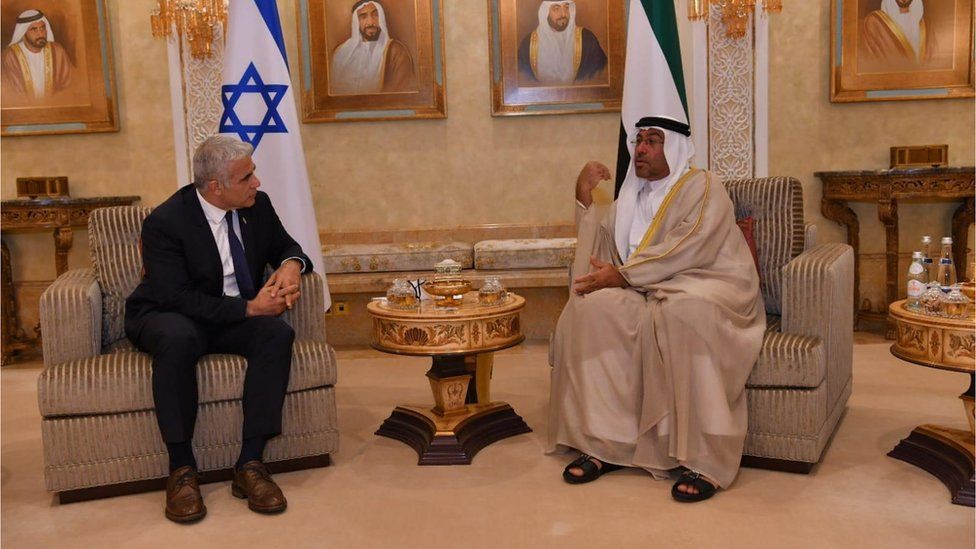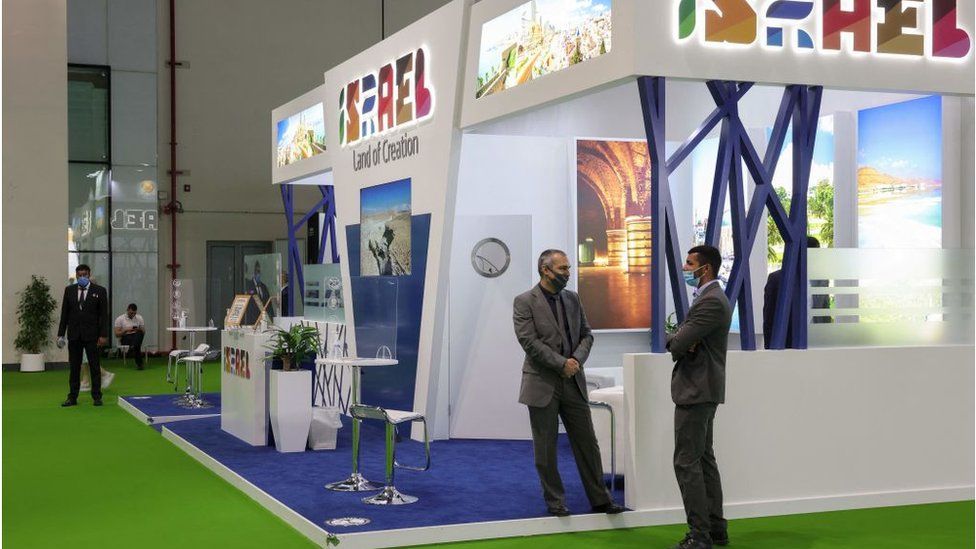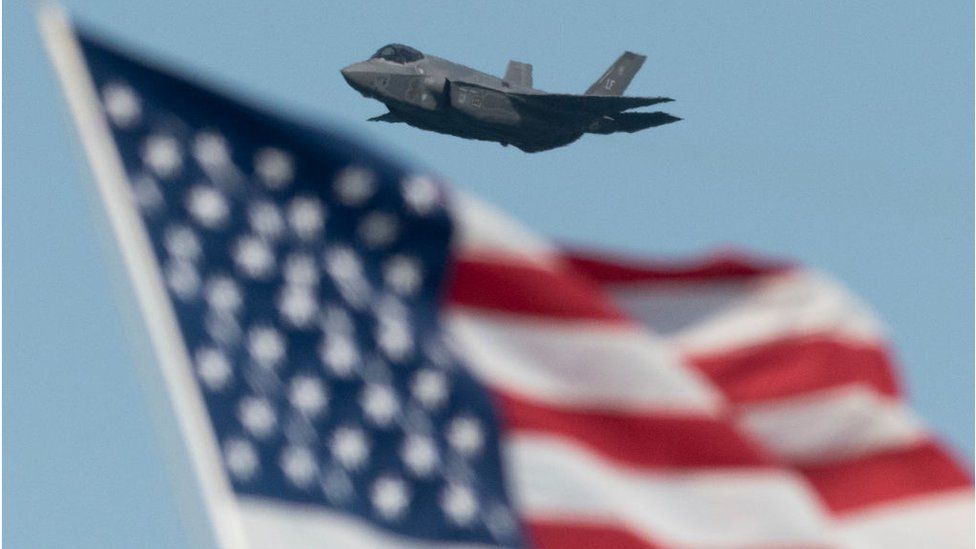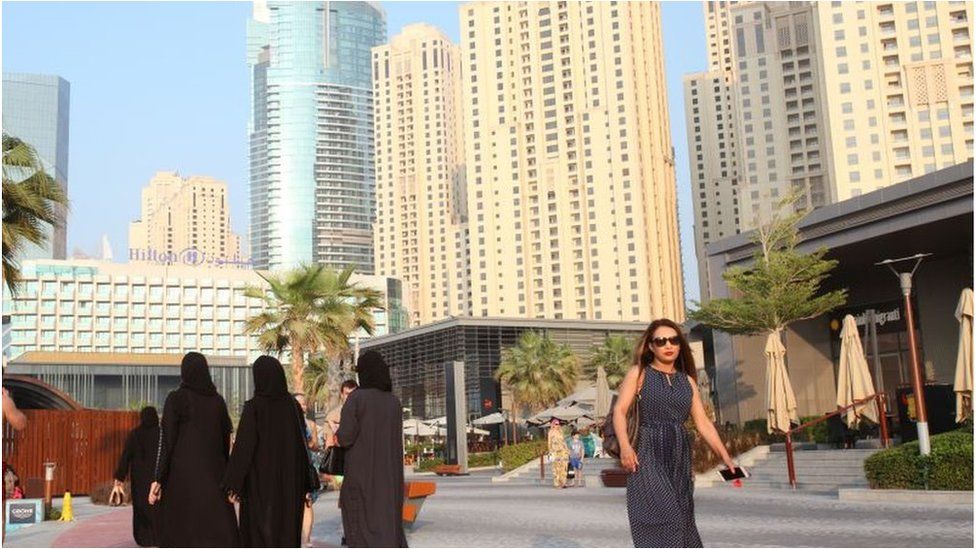Israeli minister's landmark visit to UAE signals deepening ties
By Sameer Hashmi
BBC Middle East business correspondent
The arrival of Israel's Foreign Minister, Yair Lapid, in the United Arab Emirates on Tuesday is a landmark moment for his country and the Arab world.
Mr Lapid is the first Israeli minister to pay an official visit to the Gulf state since Israel, the UAE and Bahrain signed a historic deal to normalise ties nine months ago.
During the two-day trip, Mr Lapid will meet his Emirati counterpart, Sheikh Abdullah bin Zayed Al Nahyan, and inaugurate the Israeli embassy and consulate office in Abu Dhabi and Dubai respectively.
The visit is important not only for its symbolic significance but also because it will be the first official engagement between the two sides since the Israel-Gaza conflict in May. At least 256 people were killed in Gaza, according to the UN, and 13 people were killed in Israel during the hostilities.
The 11-day conflict was the first test for the newly forged relationship - especially given that the UAE leadership had billed the normalisation deal as an opportunity to halt Israel's plans to annex parts of the occupied West Bank, which were vehemently opposed by the Palestinians.
In the lead-up to the fighting the UAE had condemned the potential eviction by Israel of Palestinians from homes contested by Jewish settlers in East Jerusalem - a focal point for rising Israel-Palestinian tensions - and had urged Israel to defuse the situation.
During the hostilities, however, the UAE could do little to deploy diplomatic leverage to pressure the Jewish state to limit the scale of its attacks on Gaza, from where militants fired thousands of rockets.
It is difficult to gauge public mood on contentious political issues in the UAE, an autocratic state, but anger was palpable on social media with citizens condemning Israeli action and showing support for Palestinians.
Despite this, Abdulkhaleq Abdullah, a Dubai-based political scientist, believes that Mr Lapid's historic visit shows that both countries have weathered the storm well.
"The bilateral relationship has passed its first test, and it shows its irreversible," he says.
"The UAE is adopting two tracks: first is the normalisation path, and the second that it still supports the Palestinian right to have their own state."
Regional ambitions
Israel and the UAE had different objectives when they decided to normalise ties last year. From Abu Dhabi's perspective, security was at the heart of its decision, while for Israel, economic co-operation with the UAE - and acceptance by an Arab state - were the main drivers.
Shortly after the agreement, known as the Abraham Accords, was reached, then-US President Donald Trump's administration authorised the sale of 50 advanced F-35 fighter jets to the UAE. This was a huge shot in the arm for UAE, as the acquisition will not only beef up its military capabilities but also give it a strategic edge in the region.
According to Bader Al-Saif, a Kuwait-based fellow with the Carnegie Middle East Center, the agreement with Israel reflects the UAE's long-term ambition of being an important geopolitical player on the global stage.
"Through this deal, the UAE is betting on elevating its security stature in the region," he says.
"They have established themselves as an important economic hub but now they want to be one of main leaders in the Middle East."
Boon for Israel
The economic partnership has flourished since the accords were reached, with a flurry of business deals signed across multiple sectors, including healthcare, artificial intelligence, defence and travel.
In April, Abu Dhabi's sovereign wealth fund, Mubadala Investment, signed a memorandum of understanding to buy a stake in an Israeli natural gas field for as much as $1.1bn (£790m; €922m). If the deal goes through it will be the biggest between the two countries yet.
Data suggests that when it comes to trade ties, Israel has been the early winner.
According to Karen Young, director of the Economics and Energy Program at the Middle East Institute, the total value of investments from the UAE to Israel touched $80m between September 2020 and March 2021. During the same period, the capital inflow from Israel to the UAE amounted to less than $25m.
Emirati investments into Israel have been led by state entities. Ms Young expects that trend to continue, especially after the recent Israel-Palestinian violence.
"What happened in May turned off a lot of private businesses in the UAE that may have been willing to go into Israel as investors," she says.
But even as private investments from the UAE are expected to remain subdued, Ms Young thinks that investments by state entities - specifically in technology, defence, water and food - will continue as these sectors are a priority for the UAE government.
"There were going to be obvious difficulties in pursuing this relationship, including opening up investment ties, but they will hold firm because the UAE government is strongly committed to seeing this through," she says.




No comments:
Post a Comment